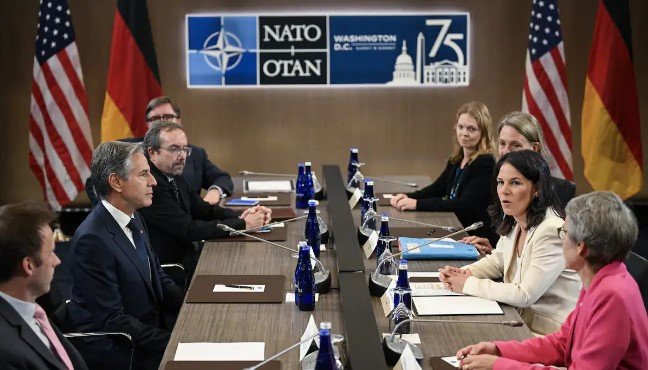Why NATO is Now Calling China a ‘Decisive Enabler’ of Russia in the Ukraine War
NATO's recent declaration labeling China as a "decisive enabler" of Russia's war against Ukraine marks a significant shift in the alliance's stance on Beijing. This shift reflects the growing recognition of the interconnectedness of global security threats and the need for a unified response to emerging challenges.
NATO leaders accused Beijing of playing a key role in helping Moscow's assault on Ukraine.
NATO's decision to label China as a "decisive enabler" of Russia's war against Ukraine is a significant development that underscores the interconnected nature of global security threats. By recognizing and addressing the challenges posed by China's support for Russia, NATO is taking proactive steps to enhance its resilience and protect its member states' security interests. As the alliance continues to evolve, its engagement with the Indo-Pacific will play a crucial role in shaping the future of global security.
Key Reasons Behind NATO's Shift
China's Support for Russia:
"No Limits" Partnership: Since the declaration of a "no limits" partnership between China and Russia in February 2022, Beijing has deepened its political, economic, and military ties with Moscow. This partnership was solidified just weeks before Russia's full-scale invasion of Ukraine.
Economic Lifeline: China has surpassed the European Union to become Russia's top trade partner, providing crucial support to the Russian economy amidst heavy international sanctions. This includes the export of dual-use goods that have bolstered Russia's defense sector.
Military Exercises: The two nations have continued to hold joint military exercises, further strengthening their strategic alliance.
Growing Geopolitical Threats:
Regional Security Concerns: NATO leaders have become increasingly alarmed by China's activities in the Indo-Pacific, which directly impact Euro-Atlantic security. Beijing's actions in outer space, its rapidly expanding nuclear arsenal, and its cyber and hybrid activities pose significant threats.
China's Assertive Foreign Policy: Under Xi Jinping's leadership, China has adopted a more aggressive stance in its foreign policy, challenging the existing world order and increasing regional tensions.
NATO's Evolving Focus:
Engagement with Asia: For the third consecutive year, leaders from New Zealand, Japan, South Korea, and Australia attended the NATO summit, signaling closer ties between the bloc and these key US allies in Asia.
Linking Security Interests: NATO's declaration highlights the importance of the Indo-Pacific to Euro-Atlantic security, emphasizing the need for cross-regional dialogue and practical cooperation on issues like cyber defense, countering disinformation, and technology.
International Response to China's Actions:
Unified Stance: The NATO leaders' statement reflects a unified stance against China's support for Russia, urging Beijing to cease all material and political support for Russia's war effort.
Sanctions and Accusations: The US and European leaders have accused China of providing dual-use goods to Russia, which have been vital for the production of tanks, munitions, and armored vehicles. In response, both the US and the EU have sanctioned Chinese entities allegedly supporting the war effort.
NATO Secretary General Jens Stoltenberg gestures while speaking during a news conference at the NATO summit in Washington, Wednesday, July 10, 2024. (Matt Rourke/AP Photo)
Implications for Global Security
Strengthening Alliances:
Enhanced Cooperation: NATO's declaration signals a commitment to strengthening alliances and enhancing resilience against shared threats. This includes increasing dialogue and cooperation with Indo-Pacific allies to address cross-regional challenges.
Collective Security Measures: The alliance is boosting its preparedness and protecting against coercive tactics and efforts to divide member states, underscoring the importance of unity in the face of global security threats.
China's Response:
Rejection of Accusations: China has criticized NATO's statement as filled with "Cold War mentality" and "belligerent rhetoric," denying any role in the Ukraine conflict and emphasizing its position as a potential peace broker.
Strategic Positioning: Beijing has reiterated its stance that the Asia-Pacific should be a region of peaceful development, not geopolitical competition, and has called on NATO to abandon its perceived zero-sum game mentality.
Future of NATO's Engagement:
Increased Focus on Indo-Pacific: NATO's attention on the Indo-Pacific is likely to continue growing, reflecting the region's strategic importance to global security. This will involve deepening ties with regional powers and addressing shared security challenges.
Adapting to New Threats: The alliance is evolving to address new and emerging threats, including cyber and hybrid activities, disinformation campaigns, and the rapid advancement of military technologies.




